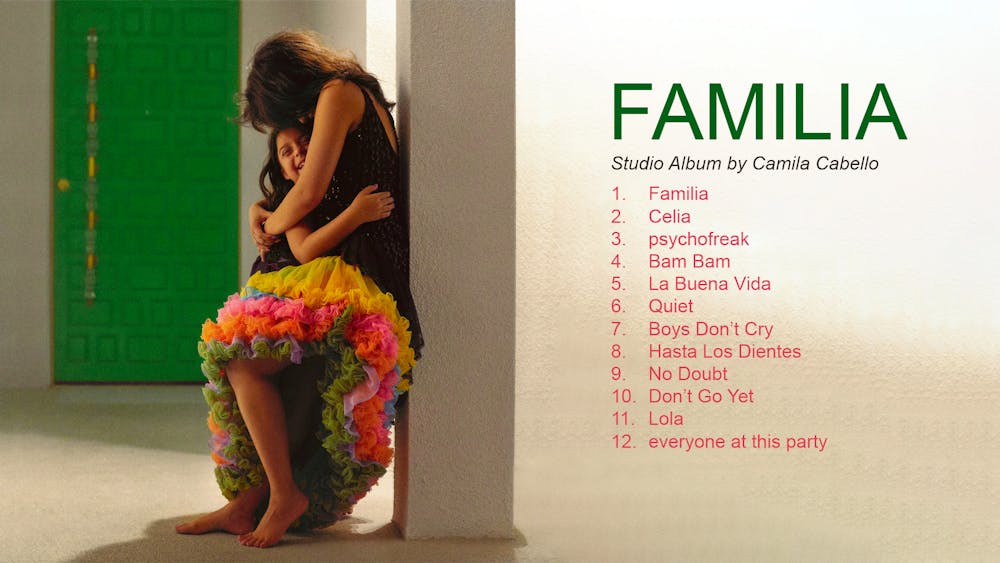Camila Cabello has always hovered between the A–list and B–list of pop singers. She debuted with the girl group Fifth Harmony via X Factor in 2012, creating hits like “Worth It” and “Work from Home,” but never really having household recognition unlike the similarly formed One Direction. Cabello left the group at its peak, and her first few solo singles didn’t quite latch on to the public, but “Havana” took over the world by storm, becoming her first number–one song as a solo artist. Her second album Romance was riddled with media gossip thanks to her relationship with Shawn Mendes, and it spawned the summer hits “Señorita” and “My Oh My.”
But on her third album, Familia, Cabello is more reflective about her fears and doubts from the past. “I been on this ride since I was fifteen / I don't blame the girls for how it went down,” Cabello reflects on the electropop song “psychofreak,” where she also addresses her feelings about her former bandmates. And while the lyrics of the song contain honest thoughts of anxiety, they're layered over a single melody that repeats throughout the song, save the prechorus courtesy of WILLOW. Perhaps the intent was to emphasize the constant feedback loop of fear and anxiety, but it doesn’t translate well in song form. Instead, we get a repetitive melody that decreases the song’s replay value, hindering the true message that Cabello wants to convey to the world.
Another such song that fails to make an impact is “Bam Bam” with Ed Sheeran. A Latin–pop–inspired song, this entry is more along the lines of what the songstress has done before. Cabello sings about her failed relationship with Shawn Mendes, commenting, “Así es la vida, sí,” or, “That’s life, yeah” and how “Love came around and it knocked [her] down / But [she’s] back on [her] feet.” Yet the relatively introspective lyrics are juxtaposed against the mumbling postchorus of “bidi bam bam,” and the emotional weight never quite reaches its peak, with its run–of–the–mill pop production doing no favors. Plus, the additional billing of Sheeran doesn't really aid the song’s sentimental nature—his appearance is only a way for radio stations to sell their collaboration.
“psychofreak” and “Bam Bam” demonstrate Familia’s biggest weakness: Cabello’s inability to commit to a singular theme. For an album that’s meant to be her most personal and close to home, Familia sometimes misses the mark solely because of Cabello’s attempts to simultaneously create radio hits. As a result, her album is scattered between different ideas and sounds, with no singular thread connecting them.
The album track “Quiet” shares the same flawed footprint. Likely written before her split with Mendes, Cabello confesses that when he kisses her, "it's quiet” compared to her usual anxious mind. The songwriting on this album is considerably better compared to her debut and sophomore efforts, but the production holds her back, making “Quiet” sound like another generic pop song of the last decade.
But while Cabello’s attempts to balance authenticity and commercial appeal don’t always work out, the album excels the most when she gets it just right. The lead single “Don’t Go Yet” is a bombastic, in–your–face Latin–pop song. Minus the minor controversy behind a performance involving a very bad fake tan, the song sounds like a celebration of Cabello's roots. She not only sounds most comfortable on “Don’t Go Yet” but also displays a quirk to her personality unrevealed in past projects. “Baby, don't go yеt, 'cause I wore this dress for a lil' drama in the bed,” she cheekily tosses off in a descending scale in the second verse, and the listener can't help but join along with her festivities.
And if “Don’t Go Yet” is Cabello’s best attempt at coming off as genuine and personal while appealing to the radio, it’s when she doesn’t try to be mainstream that the album reaches its emotional climax. This is most apparent in the second half of the album, where the songstress embraces her roots. On “Hasta Los Dientes,” Cabello leans fully into her Latin sound, and she sings about wanting someone for herself to the point where her teeth hurt (“¿Me entiendes? Me duelen hasta los dientes”). The entire song is sung in Spanish, and it's elevated by thoughtful contributions by both Cabello and Maria Becerra, making their desperation more sincere and direct.
“Lola” features Cuban singer Yotuel, and here Cabello is fully in line with her Cuban background. Besides the incorporation of her culture, the perspective from which she’s singing—a woman who had the potential to be great but was hindered by her familial background and cultural norms—comes off as if she’s singing from the heart. This song embodies the theme of Familia the most: One’s experiences and background can be messy, but it’s what one does with these relationships that matters. For Cabello, that means telling her story through song, and “Lola” is her best effort at doing just that.
But instead of ending the album there, the singer ends with the piano–laced ballad, “everyone at this party.” While the song itself is sweet, describing the aftermath of the breakup between herself and Mendes, it feels disjointed coming out of the slow salsa beat of “Lola,” making it feel like the obligatory inclusion in the tracklist. On an album trying to do everything at once, perhaps these last two tracks demonstrate this lack of focus the best. Cabello can be a great songwriter—she just needs to choose that over mainstream appeal.







